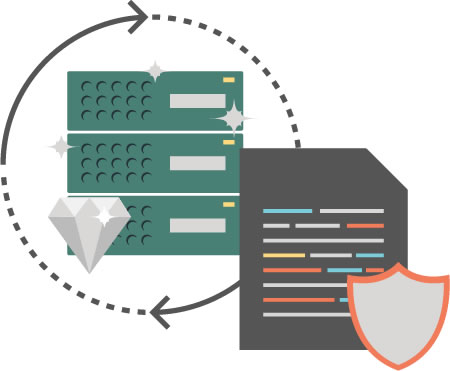Shared web hosting
The shared web hosting service refers to a web hosting service where many websites reside on a web server
connected to the Internet. This is generally the most economical option for hosting, since the overall cost
of server maintenance is amortized in many clients.
The service must include system administration, as it is shared by many users. This is a benefit for users
who don't want to deal with it, but an obstacle for advanced users who want more control. In general, shared
hosting will be inappropriate for users who require extensive software development outside of what the hosting
provider supports. Almost all applications intended to be on a standard web server work well with a shared web
hosting service. But, on the other hand, shared hosting is cheaper than other types of hosting, such as dedicated
server hosting. Shared hosting generally has usage limits and hosting providers must have extensive reliability
functions.
Shared hosting services generally offer basic web statistics support, email and webmail services, automatic
scripting, PHP and MySQL updates, basic after-sales technical support that is included with a monthly subscription.
You also usually use a web-based control panel system. Most large hosting companies use their own custom developed
control panel. However, control panels and web interfaces can cause controversy since web hosting companies sometimes
sell the right to use their control panel system to others. Trying to recreate the functionality of a specific control
panel is common, which leads to many claims for patent infringement.

In shared hosting, the provider is generally responsible for managing servers, installing server software, security
updates, technical support and other aspects of the service. Most servers are based on the Linux operating system and LAMP
(software package). Some providers offer solutions based on Microsoft Windows or FreeBSD. Server-side installations for
any operating system (OS) have similar functionality (for example: MySQL (database) and many server-side programming
languages (such as the widely used PHP programming language) on Linux, or the patented SQL Server (database) and ASP
.NET programming language in Microsoft Windows.
There are thousands of shared hosting providers. They range from "family stores" and small design companies to
billionaire suppliers with hundreds of thousands of customers. A large part of the shared web hosting market is managed
through pay per click advertising (PPC) or affiliate programs, while some are purely non-profit.
Shared web hosting can also be done privately by sharing the cost of running a server in a placement center, this is
called cooperative hosting.
Implementation
Shared web hosting can be achieved in two ways: based on the name and based on the Internet protocol (IP-based),
although some control panels allow a combination of name and IP-based on a server.
IP based
In IP-based virtual hosting, also called dedicated IP hosting, each virtual host has a different IP address. The
web server is configured with multiple physical network interfaces or virtual network interfaces on the same physical
interface. The web server software uses the IP address to which the client connects to determine which website to
display to the user. The problem of exhaustion of the IPv4 address means that IP addresses are an increasingly scarce
resource, so the main justification for a site to use a dedicated IP is to be able to use its own SSL / TLS certificate
instead of a shared certificate .
Based on the name
In name-based virtual hosting, also called IP shared hosting, virtual hosts serve multiple host names on a single
machine with a single IP address. This is possible because when a web browser requests a resource from a web server
using HTTP / 1.1, it includes the requested host name as part of the request. The server uses this information to
determine which website to display to the user.
Understanding DNS and name servers
Showing how name servers connect
DNS means "Domain Name System." The domain name system acts as a large telephone directory and in that is the
master database, which associates a domain name such as www.google.com with the appropriate IP number. Consider
the IP number similar to a phone number: when someone calls www.google.com, the ISP looks at the DNS server and
asks "how do I contact www.google.com?" The DNS server responds, for example, "can be found at: 91.198.174.192".
As the Internet understands, this can be considered the phone number of the server that hosts the website. When
the domain name is registered / purchased on a "name server" of a particular registrar, the DNS configuration is
maintained on your server and, in most cases, points the domain to the hosting provider's name server . This name
server is where the IP number resides (currently associated with the domain name).




